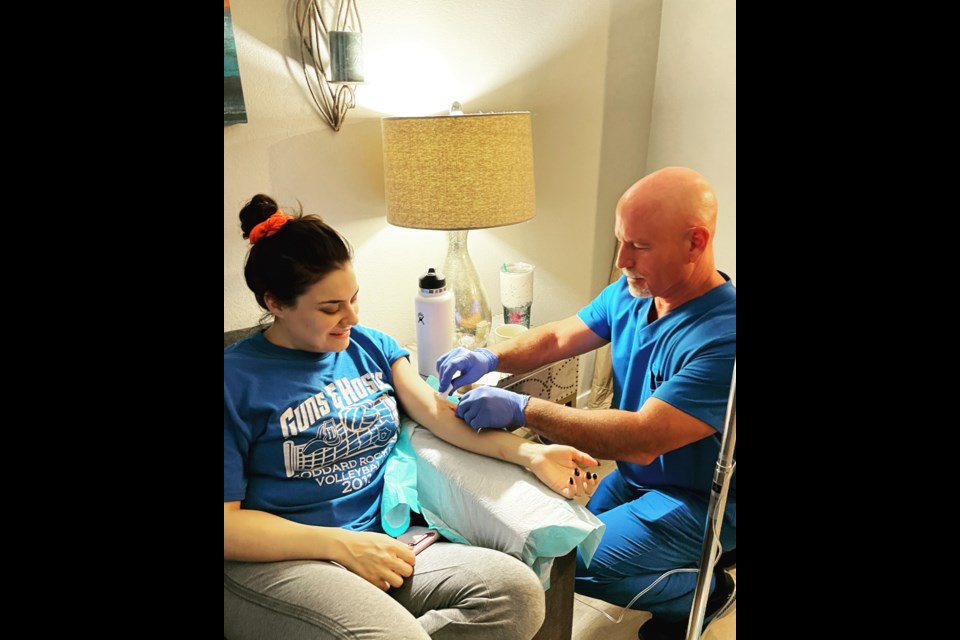Since the coronavirus pandemic started nearly three years ago, the IV therapy industry has seen an increase in the popularity of their services.
“When the pandemic hit, lots of people started to feel concerned about their immune system and they wanted to keep it functioning properly,” said Zack Stewart, owner of the Recovery Room in Scottsdale.
The IV therapy industry is growing in Arizona from new mobile IV start-up businesses to existing clinics, and franchises expanding all around the Valley.
IV fluids are formulated liquids with vitamins, minerals and amino acids that are injected into veins. According to the Cleveland Clinic, it is a simple, safe and common procedure with a low risk of complications.
Niko Ferguson operates her mobile IV business iDripDuo out of Scottsdale with her husband Shon Ferguson. The couple has been registered nurses for over 20 years and they decided to start their IV therapy business as a side hustle during the last few months of 2020.
“Working in the hospitals during the pandemic was really difficult and it weighed on us so we decided we wanted to help people in a different way,” Ferguson said.
During the pandemic, people were turned away from emergency rooms and their primary care doctor’s offices if their symptoms were not considered severe or if they were not in need of emergent attention.
Jim Schafer, co-owner of Element IV Therapy based out of central Phoenix, said he used his business to treat the patients that were turned away from places like hospitals and doctor’s offices.
“We know that in healthcare, (our job) is to take care of people and so we would go to their homes to help them feel better no matter what illness they had, we were there for them,” Schafer said.
The IV therapy businesses administer treatments for a variety of different reasons whether someone is fighting an illness like the flu or a long-term chronic condition.
Joseph Lopez, CEO of Arizona IV Medics which operates throughout the whole state, said he noticed that there is a stigma behind the IV therapy industry’s purpose.
“When people see IVs they mostly think (they cure) hangovers but the majority of our business calls are for chronic illnesses, migraines, the fu, COVID-19, respiratory syncytial virus (RSV) and common colds,” Lopez said. “I’d say only about 10% of our calls are for hangovers.”
While many patients do receive IV treatments when they are fighting illnesses, Ferguson said she has about 12 patients who she sees on a regular basis.
“One of my regular clients is always flying for work and she sees that (after getting treatment) she has a lot more energy, she does not get sick as often, and she sleeps better,” Ferguson said. “I see her nearly every three weeks.”
Stewart said one of the biggest aspects of owning his IV business is the need to recognize that although some patients call for an IV treatment, not all of them like it.
“I make sure to hire nurses with really great IV skills because a lot of people hate needles and they’re not going to want to spend money on getting poked a bunch of times,” Stewart said. “We really try to get (their vein) on the first try.”
The IV therapy industry is growing and Allied Market Research reported that the global IV therapy and vein access market generated $22.8 billion in 2020, and is projected to reach $37.5 billion by 2030.
Schafer said he decided to start his IV business because he recognized the trend that consumers are paying for things to be delivered to their homes and he believes that trend is not going to fade away.
“I think we’re going to see the trend of health care coming to your home spark, almost like the olden days when a family doctor would come to do a home visit,” Schafer said.
IV treatments can be different for each patient and many of the businesses can create different combinations of the fluids to help different needs.
“We don't claim that our treatments are a cure of any kind, they just (provide) help for the body to fight any illnesses,” Ferguson said.
Lopez said he believes the IV therapy industry will continue to grow as so many patients love the results of their treatments.
“People love to feel hydrated,” Lopez said.
To connect with one of the IV businesses you can visit their websites to learn more about the treatments, schedule appointments, and speak with the staff about the different treatment options.



